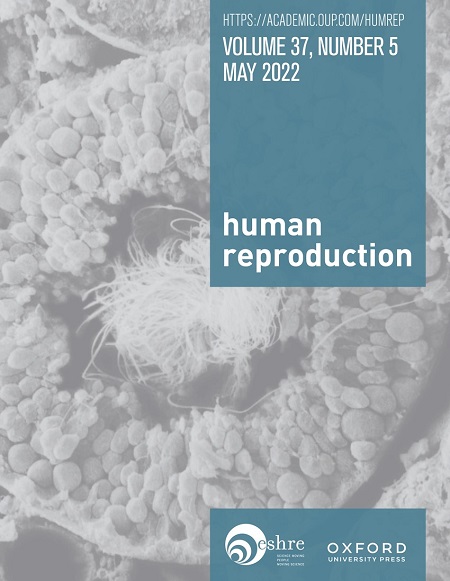Sexual, relational, and psychological functioning in male partners of women with reported Mayer–Rokitansky–Küster–Hauser syndrome—a case–control study
IF 6
1区 医学
Q1 OBSTETRICS & GYNECOLOGY
引用次数: 0
Abstract
STUDY QUESTION Do sexual, relational, and psychological functioning of male partners of women with Mayer–Rokitansky–Küster–Hauser (MRKH) syndrome differ from male partners of women without MRKH syndrome? SUMMARY ANSWER Male partners of women with MRKH syndrome did not significantly differ in sexual functioning but reported higher relational satisfaction and less anxiety than the control group. WHAT IS KNOWN ALREADY To date, only a few studies have reported occasionally about sexual, psychological, and relational functioning of partners of women with MRKH syndrome. The results seem to suggest sexual satisfaction in these men, contrary to the more often reported insecurities in women with MRKH syndrome surrounding sexuality and relationships. STUDY DESIGN, SIZE, DURATION In this case–control study, 42 male partners of women with MRKH syndrome and 40 partners of women without the condition were enrolled. PARTICIPANTS/MATERIALS, SETTING, METHODS All participants were recruited through women with MRKH syndrome and age-matched women without the condition who participated in a previous case–control study on sexual, psychological, and relational functioning. Participants live in a heterosexual relationship for at least in the last 6 months and have a basic understanding of the Dutch language. They were administered a set of online questionnaires to assess sexual, relational, and psychological functioning. MAIN RESULTS AND THE ROLE OF CHANCE Partners of women with MRKH syndrome did not differ significantly in overall sexual functioning and had similar percentages of sexual dysfunction and sexual distress as the control group. Partners of women with MRKH syndrome reported significantly less relational dissatisfaction (P = 0.01; Cohen’s d = 0.6) than partners of women without the condition. There was no significant difference in overall psychological functioning or the presence of clinically relevant anxiety and depression, but the men in the MRKH group had a significantly lower anxiety score (P = 0.01; Cohen’s d = 0.6). LIMITATIONS, REASONS FOR CAUTION We were not able to reach a sample size needed for enough power to detect small to medium effect sizes. Confounding factors and selection bias cannot be excluded. WIDER IMPLICATIONS OF THE FINDINGS The study offers new knowledge on a perspective that remains underexposed so far, which makes comparison to previous literature difficult. More research is needed to apply the results in clinical practice. STUDY FUNDING/COMPETING INTEREST(S) This research was supported by the Dutch Scientific Society of Sexology (Nederlandse Wetenschappelijke Vereniging Voor Seksuologie). There was no involvement in the conduct of the research, and the funding was unrestricted. There are no conflicts of interest to declare. TRIAL REGISTRATION NUMBER N/A.报告有meyer - rokitansky - k ster - hauser综合征的女性男性伴侣的性、关系和心理功能——病例对照研究
研究问题:患有MRKH综合征的女性的男性伴侣的性、关系和心理功能与没有MRKH综合征的女性的男性伴侣不同吗?MRKH综合征女性的男性伴侣在性功能方面没有显著差异,但报告的关系满意度高于对照组,焦虑程度低于对照组。迄今为止,只有少数研究偶尔报道了MRKH综合征女性伴侣的性、心理和关系功能。研究结果似乎表明,这些男性在性方面很满足,而与之相反的是,患有MRKH综合征的女性在性和人际关系方面往往缺乏安全感。研究设计、规模、持续时间在这项病例对照研究中,纳入了42名MRKH综合征女性的男性伴侣和40名无MRKH综合征女性的伴侣。参与者/材料、环境、方法所有的参与者都是通过之前参与过关于性、心理和关系功能的病例对照研究的MRKH综合征女性和年龄匹配的无MRKH综合征女性招募的。参与者在过去的6个月里至少有一段异性恋关系,并且对荷兰语有基本的了解。研究人员对他们进行了一套在线问卷调查,以评估他们的性、关系和心理功能。MRKH综合征女性的总体性功能没有显著差异,性功能障碍和性困扰的比例与对照组相似。MRKH综合征女性伴侣对关系不满意的反映明显少于MRKH综合征女性伴侣(P = 0.01;Cohen’s d = 0.6)。总体心理功能及临床相关焦虑、抑郁的存在无显著差异,但MRKH组男性的焦虑评分显著低于MRKH组(P = 0.01;Cohen’s d = 0.6)。局限性,谨慎的原因我们无法达到足够的样本量来检测中小型效应大小。不能排除混杂因素和选择偏差。研究结果的更广泛含义该研究提供了一个迄今为止尚未充分暴露的视角的新知识,这使得与以前的文献进行比较变得困难。需要更多的研究将结果应用于临床实践。研究经费/竞争利益(S)本研究由荷兰性学科学学会(Nederlandse Wetenschappelijke Vereniging Voor Seksuologie)支持。他们不参与研究的实施,资金也不受限制。没有需要申报的利益冲突。试验注册号n / a。
本文章由计算机程序翻译,如有差异,请以英文原文为准。
求助全文
约1分钟内获得全文
求助全文
来源期刊

Human reproduction
医学-妇产科学
CiteScore
10.90
自引率
6.60%
发文量
1369
审稿时长
1 months
期刊介绍:
Human Reproduction features full-length, peer-reviewed papers reporting original research, concise clinical case reports, as well as opinions and debates on topical issues.
Papers published cover the clinical science and medical aspects of reproductive physiology, pathology and endocrinology; including andrology, gonad function, gametogenesis, fertilization, embryo development, implantation, early pregnancy, genetics, genetic diagnosis, oncology, infectious disease, surgery, contraception, infertility treatment, psychology, ethics and social issues.
 求助内容:
求助内容: 应助结果提醒方式:
应助结果提醒方式:


